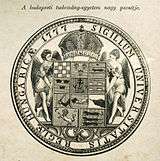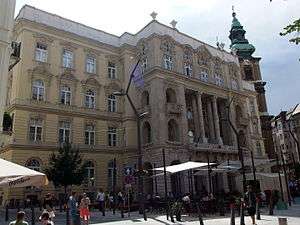Eötvös Loránd University
| Eötvös Loránd Tudományegyetem (Hungarian) | |
 | |
| Latin: Universitas Budapestinensis de Rolando Eötvös nominata | |
| Motto | Community of Knowledge |
|---|---|
| Type | Public research university |
| Established | 1635 |
| Chancellor | Dr. Gyula Scheuer |
| Rector | Barna Mezey, D.Sc |
Academic staff | 1,800[1] |
| Undergraduates | 16,017[2] |
| Postgraduates | 8,547 |
| 1,442 | |
| Location |
47°29′26″N 19°03′31″E / 47.4906°N 19.0585°ECoordinates: 47°29′26″N 19°03′31″E / 47.4906°N 19.0585°E |
| Campus | Urban |
| Affiliations | |
| Website | elte.hu |
Eötvös Loránd University (Hungarian: Eötvös Loránd Tudományegyetem or ELTE) is a Hungarian public research university based in Budapest. Founded in 1635, ELTE is one of the largest and the most prestigious[3] public higher education institutions in Hungary. The 28,000 students at ELTE are organized into eight faculties, and into research institutes located throughout Budapest and on the scenic banks of the Danube. ELTE is affiliated with 5 Nobel laureates, as well as winners of the Wolf Prize, Fulkerson Prize and Abel Prize, the latest of which was Abel Prize winner Endre Szemerédi in 2012.
The predecessor of Eötvös Loránd University was founded in 1635 by cardinal Péter Pázmány as a catholic university for teaching theology and philosophy. In 1770, the University was transferred to Buda, and with the support of Maria Theresa, Empress of Austria and Queen of Hungary, became the Royal Hungarian University. It was named Royal University of Pest until 1873, then University of Budapest until 1921, when it was renamed Pázmány Péter University after its founder Péter Pázmány. The Faculty of Science started its autonomous life in 1949 when The Faculty of Theology was separated from the university. The university received its current name in 1950, after one of its most well-known physicist, Baron Loránd Eötvös.
History

The university was founded in 1635 in Nagyszombat, Kingdom of Hungary, (today Trnava, Slovakia) by the archbishop and theologian Péter Pázmány. Leadership was given over to the Jesuits. Initially the university only had two colleges (College of Arts and College of Theology). The College of Law was added in 1667 and the College of Medicine was started in 1769. After the dissolution of the Jesuit order, the university was moved to Buda (today part of Budapest) in 1777 in accordance with the intention of the founder. The university moved to its final location in Pest (now also part of Budapest) in 1784. The language of education was Latin until 1844, when Hungarian was introduced as an official language. Women have been allowed to enroll since 1895.[4]
Campus


Lágymányosi campus
The Lágymányosi campus is home to the Faculty of Science, the Faculty of Informatics and the Faculty of Social Sciences. The campus is located in the 11th district of Budapest.
Academic profile
ELTE is Hungary’s largest scientific establishment with 118 PhD programs at 17 doctoral schools, and also offers 38 bachelor’s programs, 96 master’s programs, and over 50 degree programs in foreign languages. The course credits awarded are transferable to universities in Europe through the Bologna process.[5]}}
The eight faculties are:
- Faculty of Law and Political Sciences (ÁJK)
- Bárczi Gusztáv Faculty of Special Education (BGGyK)
- Faculty of Humanities (BTK)
- Faculty of Informatics (IK)
- Faculty of Education and Psychology (PPK)
- Faculty of Social Sciences (TáTK)
- Faculty of Elementary and Nursery School Teachers' Training (TÓK)
- Faculty of Science (TTK)
Reputation and rankings
| University rankings | |
|---|---|
| Global | |
| ARWU[6] | 301-400 |
| Times[7] | 401- |
| QS[8] | 551-600 |
In the 2013-14 QS World University Rankings, Eötvös Loránd University was ranked 551-600th, while the Times Higher Education World University Rankings did not include the university among the best 400 universities. Academic Ranking of World Universities ranked the university among the best 301-400. International Colleges and Universities ranked the university as the 158th globally.
Notable alumni

Nobel prize winners:
- Lénárd Fülöp, Nobel Prize for Physics (1905)
- Albert Szent-Györgyi, Nobel Prize in Physiology or Medicine for discoverer of Vitamin C (1937)
- Hevesy György, Nobel Prize for Chemistry (1943)
- Békésy György, Nobel Prize in Physiology or Medicine (1961)
- Harsányi János, Nobel Memorial Prize in Economic Sciences (1994)
Other notable alumni:
- Miklós Ajtai, Knuth Prize (2003)
- József Antall, Prime Minister of Hungary, 1990-1993
- Wilhelm Bacher
- Albert-László Barabási, physicist, concept of scale-free networks, C&C Prize (2008)
- Károly Bezdek
- Christine L. Borgman
- Zoltán Dörnyei, applied linguist
- Ahn Eak-tai
- Paul Erdős, mathematician
- Péter Esterházy, novelist
- Tamás Freund, neuro-scientist, one of three (Hungarian ) co-winners of the (first) Danish Brain Award 2011
- Laszlo Garai
- Peter G. Gyarmati
- Gyorgy Busztin, Ambassador and UN diplomat
- Pál Schiller Harkai
- Ágnes Heller
- John Harsanyi, Nobel Prize in Economics (1994)
- Zsuzsanna Jakab
- László Kákosy
- László Kalmár, mathematician
- Karl Kerényi, co-founder of modern studies in Greek mythology
- Judit Kormos, applied linguist
- Andras Kornai
- Radó von Kövesligethy, (astro-and geo-) physicist, Kövesligethy´s spectralequation (1885)
- Ferenc Krausz, physicist, founder of attophysics, director at the Max Planck Institute for Quantum Optics (2003)
- Miklós Laczkovich, mathematician
- Cornelius Lanczos, mathematician
- László Lovász, mathematician, Knuth Prize (1999), Bolyai prize (2007), Kyoto Prize (2010)
- Ioan Lupaş
- Iuliu Maniu
- László Mérő
- Ingo Molnár, Linux kernel developer
- Péter Molnár
- Krisztina Morvai, lawyer and MEP
- Teodor Murăşanu
- Ádám Nádasdy
- John von Neumann, mathematician, founding figure in computing
- Viktor Orbán, Prime Minister of Hungary, 1998–2002, 2010–
- Raphael Patai
- Ágoston Pável
- János Pach, mathematician
- Rózsa Péter, mathematician
- Karl Polanyi
- Michael Polanyi, polymath, father of John Polanyi (Nobel Prize winner in chemistry)
- Peter Pulay
- Michael Somogyi
- József Szájer
- Endre Szemerédi, Abel Prize (2012)
- Albert Szent-Györgyi, Nobel Prize in Physiology or Medicine (1937), discoverer of Vitamin C
- Franz Tangl
- Éva Tardos, member of the American Academy of Arts and Sciences
- Stephen Ullmann
- Ferenc A. Váli
- Sándor Wekerle, three-time prime minister
- Franz Wittmann, constructor of the Wittmann oscilloscope
- István Gyöngy, mathematician
- Van H. Vu, mathematician, Percey F. Smith Professor of Mathematics at Yale University
See also
References
- ↑ elte.hu. "Brief History of ELTE".
- ↑ elte.hu. "A brief presentation of Eötvös Loránd University, page 12 Facts and Figuers - Students".
- ↑ Kaplan, Robert B.; Baldauf, Richard B. (2005-01-01). Language Planning and Policy in Europe. Multilingual Matters. ISBN 9781853598111.
- ↑ elte.hu. "Brief History of ELTE".
- ↑ "Academic System".
- ↑ "Academic Ranking of World Universities: Global". Institute of Higher Education, Shanghai Jiao Tong University. 2016. Retrieved September 8, 2016.
- ↑ "World University Rankings 2016-2017". Times Higher Education. 2015. Retrieved October 22, 2016.
- ↑ "QS World University Rankings 2016/17". Quacquarelli Symonds Limited. 2016. Retrieved September 8, 2016.
External links
| Wikimedia Commons has media related to Eötvös Loránd University. |
- Official website
- Faculties of Eötvös Loránd University
- World University Rankings 2013
- Illustrated History of the Eötvös Loránd University